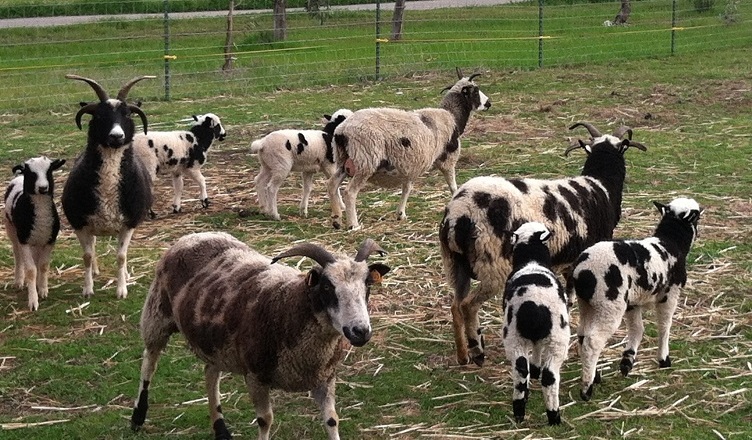From Genesis 30-31
 Today’s passage tells the story of two shepherds in competition. We will find out the LORD is with Jacob, he blesses him with large flocks.
Today’s passage tells the story of two shepherds in competition. We will find out the LORD is with Jacob, he blesses him with large flocks.
This post is part of my bible in a year series.
Passage and Comments
Jacob has served Laban for fourteen years now for both his wives Rachel and Leah.
25 As soon as Rachel had borne Joseph, Jacob said to Laban, “Send me away, that I may go to my own home and country. 26 Give me my wives and my children for whom I have served you, that I may go, for you know the service that I have given you.”
27 But Laban said to him, “If I have found favor in your sight, I have learned by divination that the LORD has blessed me because of you. 28 Name your wages, and I will give it.”
29 Jacob said to him, “You yourself know how I have served you, and how your livestock has fared with me. 30 For you had little before I came, and it has increased abundantly, and the LORD has blessed you wherever I turned. But now when shall I provide for my own household also?” (Gen 30.25-30)
‘Home and country’. During his time with Laban he has worked hard and served him well. Now he feels it will be okay for him to return to his homeland. He is about to go, but Laban has other ideas.
‘Favour’. The LORD has of course had something to do with his being blessed through Jacob. Laban wants to show some gratitude and I suspect profit some more. So he asks Jacob to name his wages.
‘Blessing’. Jacob also recognises the LORD has blessed Laban because of his presence. But he rightly recognises his primary responsibility is to his own family. This is part of the reason he wants to leave.
31 He [Laban] said, “What shall I give you?”
Jacob said, “You shall not give me anything. If you will do this for me, I will again pasture your flock and keep it:
32 let me pass through all your flock today, removing from it every speckled and spotted sheep and every black lamb, and the spotted and speckled among the goats, and they [the remainder] shall be my wages.
33 So my honesty will answer for me later, when you come to look into my wages with you. Every one that is not speckled and spotted among the goats and black among the lambs, if found with me, shall be counted stolen.” (Gen 30.31-33)
‘Lambs’, ‘Goats’. Jacob names his price. He wants sheep and goats. Sheep are usually white and goats are black. Speckled specimens are uncommon. So Laban thinks he has the better end of the deal.
34 Laban said, “Good! Let it be as you have said.”
35 But that day Laban removed the male goats that were striped and spotted, and all the female goats that were speckled and spotted, every one that had white on it, and every lamb that was black, and put them in the charge of his sons.
36 And he set a distance of three days’ journey between himself and Jacob, and Jacob pastured the rest of Laban’s flock. (Gen 30.34-36)
‘Removed’, ‘distance’. Laban agrees and quickly removes the speckled specimens out of Jacobs reach. Three days away he cannot possibly use them to breed.
Underneath their smooth words they are in conflict.
But Jacob is an experienced shepherd.
37 Then Jacob took fresh sticks of poplar and almond and plane trees, and peeled white streaks in them, exposing the white of the sticks.
38 He set the sticks that he had peeled in front of the flocks in the troughs, that is, the watering places, where the flocks came to drink. And since they bred when they came to drink, 39 the flocks bred in front of the sticks and so the flocks brought forth striped, speckled, and spotted. (Gen 30.37-39)
By putting white sticks in front of the flocks when they bred, Jacob succeeds in producing speckled sheep and goats. According to the agreement these belonged to him.
Scientifically this does not make sense, but neither is this of concern to the author.
40 And Jacob separated the lambs and set the faces of the flocks toward the striped and all the black in the flock of Laban. He put his own droves apart and did not put them with Laban’s flock.
41 Whenever the stronger of the flock were breeding, Jacob would lay the sticks in the troughs before the eyes of the flock, that they might breed among the sticks,
42 but for the feebler of the flock he would not lay them there. So the feebler would be Laban’s, and the stronger Jacob’s. (Gen 30.40-42)
Jacob is creating situations where his own flock will mate with Laban’s. He does this to increase the likelihood Laban’s flocks will also produce speckled and spotted lambs. He also restricts the breeding to the stronger animals, so that his share of the flock turns out to be the most healthy.
43 Thus the man increased greatly and had large flocks, female servants and male servants, and camels and donkeys. (Gen 30.43)
Story of Israel

In the story of Israel the vocation of shepherding is commonly associated with God’s people and God himself. God looks after his people like a shepherd his sheep. The image of God as a shepherd points to his continual direction, guidance and care for his people.
Story of Jesus
Jesus describes himself as a shepherd. But Jesus doesn’t look after sheep, he looks after people.
11 I am the good shepherd. The good shepherd lays down his life for the sheep. 12 He who is a hired hand and not a shepherd, who does not own the sheep, sees the wolf coming and leaves the sheep and flees, and the wolf snatches them and scatters them. 13 He flees because he is a hired hand and cares nothing for the sheep. 14 I am the good shepherd. I know my own and my own know me, 15 just as the Father knows me and I know the Father; and I lay down my life for the sheep. 16 And I have other sheep that are not of this fold. I must bring them also, and they will listen to my voice. So there will be one flock, one shepherd.” (Jn 10:11–16)
My prayer is that you are one of Jesus’ sheep or will become one, joining many others in his flock. Sheep who hear and know his voice. Sheep he has died for.
Copyright © Joshua Washington and thescripturesays, 2016. All Rights Reserved.





